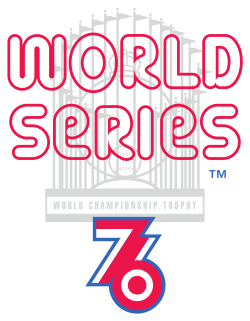Our website is made possible by displaying online advertisements to our visitors.
Please consider supporting us by disabling your ad blocker.
1976 World Series
| 1976 World Series | ||||||||||
|---|---|---|---|---|---|---|---|---|---|---|
 | ||||||||||
| ||||||||||
| Dates | October 16–21 | |||||||||
| Venue(s) | Riverfront Stadium (Cincinnati) Yankee Stadium (New York) | |||||||||
| MVP | Johnny Bench (Cincinnati) | |||||||||
| Umpires | Lee Weyer (NL), Lou DiMuro (AL), Billy Williams (NL), Bill Deegan (AL), Bruce Froemming (NL), Dave Phillips (AL) | |||||||||
| Hall of Famers | Reds: Sparky Anderson (mgr.) Johnny Bench Joe Morgan Tony Pérez Yankees: Catfish Hunter | |||||||||
| Broadcast | ||||||||||
| Television | NBC | |||||||||
| TV announcers | Joe Garagiola Marty Brennaman (in Cincinnati) Phil Rizzuto (in New York) Tony Kubek | |||||||||
| Radio | CBS | |||||||||
| Radio announcers | Bill White (in Cincinnati) Marty Brennaman (in New York) Win Elliot | |||||||||
| ALCS | New York Yankees over Kansas City Royals (3–2) | |||||||||
| NLCS | Cincinnati Reds over Philadelphia Phillies (3–0) | |||||||||
| ||||||||||
The 1976 World Series was the championship series of Major League Baseball's (MLB) 1976 season. The 73rd edition of the World Series, it was a best-of-seven playoff played between the National League (NL) champion Cincinnati Reds and the American League (AL) champion New York Yankees. The Reds swept the Series in four games to repeat as champions, avenging their 1939 and 1961 World Series losses to the Yankees. The 1976 Reds became, and remain, the only team to sweep an entire multi-tier postseason, one of the crowning achievements of the franchise's Big Red Machine era.[1] They also became the third NL team (following the Chicago Cubs in 1907–08 and the New York Giants in 1921–22) to win consecutive World Series, and remain the last to do so.
This was also the second time that the Yankees were swept in a World Series in four straight games, the Los Angeles Dodgers having previously done so in 1963. (The New York Giants "swept" them in five games in 1922, with Game 2 ending in a tie due to being called on account of darkness.) It was also the first World Series sweep in ten years, and the first for the Reds; their next came against the Oakland Athletics in 1990.
The Reds won the NL West division by ten games over the Dodgers, then defeated the Philadelphia Phillies in three straight games in the NL Championship Series, after losing seven of twelve to them during the regular season. The Yankees won the AL East division by 10+1⁄2 games over the Baltimore Orioles, then defeated the Kansas City Royals in the deciding fifth game of the AL Championship Series.
This World Series was the first in which the designated hitter rule, which had been introduced in the AL three years prior, was in effect; it was used for all games (for the first ten years, the use of the DH alternated; in even-numbered years, it was used in all games, in odd-numbered years, it was not used; starting in 1986, the DH was used only in games played at the AL representative's park).[2] The use of the DH wound up benefiting the Reds, who were able to get utility infielder Dan Driessen's bat in the lineup. Driessen hit .357 with one home run. Elliott Maddox, Carlos May, and Lou Piniella shared the role for the Yankees. Game 1, played at Cincinnati's Riverfront Stadium, marked the first time the DH was used in a NL ballpark. Game 2, also at Riverfront Stadium, was the first World Series weekend game to be scheduled at night.
Reds catcher Johnny Bench was named the World Series MVP. Bench batted .533 with 8 hits, 6 RBIs and two home runs and also scored 4 runs.
- ^ Fimrite, Ron (November 1, 1976). "Ah, How Great It Is". Sports Illustrated. p. 18.
- ^ "American League adopts designated hitter rule". history.com. Retrieved February 11, 2018.
At first, the designated hitter rule did not apply to any games in the World Series, in which the AL and NL winners met for the world championship. From 1976-1985, it applied only to Series held in even-numbered years, and in 1986 the current rule took effect, according to which the designated hitter rule is used or not used according to the practice of the home team.
Previous Page Next Page


